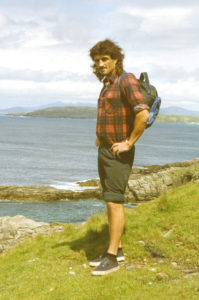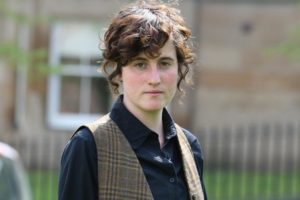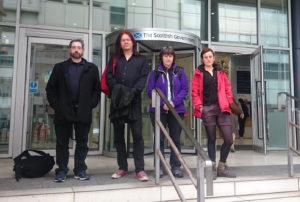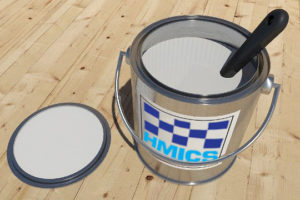
SDS officer John Dines on Barra in the Outer Hebrides. His activity is excluded from the Scottish inquiry
The Scottish government has asked a group of senior police officers to investigate spycops activity in their country.
It comes in response to the forthcoming Pitchford Inquiry into undercover policing being limited to events in England and Wales. The Home Office refused a request, supported by every party in the Scottish Parliament, to extend the Pitchford remit to Scotland.
As we’ve said previously, Scotland was not merely incidental to the political spying of the Special Demonstration Squad (SDS) and National Public Order Intelligence Unit (NPOIU). The majority of known officers worked there. Officials admit Mark Kennedy made 14 authorised visits to the country. During these, he had numerous sexual relationships that the Met themselves have described as ‘abusive, deceitful, manipulative and wrong’ and a breach of human rights. He was far from the only one – Mark Jenner, Carlo Neri and John Dines all did the same.
Having failed to secure Scotland’s inclusion in the main Pitchford inquiry, every party in Holyrood except the SNP backed the call for a separate Scottish inquiry. On Wednesday the Scottish government announced its decision. It has asked Her Majesty’s Inspectorate of Constabulary in Scotland (HMICS) to look into it. HMICS is a body of senior police officers.
HMIC’s FIRST BUCKET OF WHITEWASH
Its sister organisation for England and Wales, Her Majesty’s Inspectorate of Constabulary (HMIC), has already got a history of whitewash on the spycops scandal.
The whole issue first hit the headlines in 2011 when Mark Kennedy’s exposure caused the collapse of a trial. Since then, 49 convictions have been overturned due to Kennedy’s involvement. HMIC were asked to look into Kennedy and the two spycops units.
The report was drafted by Bernard Hogan-Howe, on a two year stint at HMIC between his roles as Chief Constable of Merseyside Police and Commissioner of the Met. By the time the report came out he was spending huge sums of Met money deploying lawyers to obstruct justice for spycops’ victims.
The HMIC report was completed by Denis O’Connor, who had been Assistant Commissioner of the Met at the time of the MacPherson Inquiry into the killing of Stephen Lawrence.
The report is believed to have portrayed Mark Kennedy as a rogue officer who had strayed from the purpose of his deployment. It was dramatically withdrawn and pulped just five hours before publication because The Guardian published revelations that another officer, Jim Boyling, had caused miscarriages of justice just as Kennedy did.
It underwent four months of rewriting and, when finally published in 2012, it still came out saying senior officers knew nothing, and basically hung Kennedy out to dry.
‘operational supervision, review and oversight were insufficient to identify that his behaviour had led to disproportionate intrusion.’
Kennedy had been in daily contact with his cover officer, who will have known where he was and what he was doing. Documents released since the HMIC report show that Kennedy was sanctioned from on high and people far up the ladder took a keen and detailed personal interest in his work.
Above the spycops units were their authorising officers.
‘it was not evident that the authorising officers were cognisant of the extent and nature of the intrusion that occurred; nor is it clear that the type and level of intrusion was completely explained to them’
What is an authorising officer doing if not asking about the necessity and impacts of the things they authorise?
But the HMIC report, in the classic style of self-investigations, says it was incompetence and ignorance rather than anything more sinister, only the lowlings did any really bad stuff, lessons have been learned and we can all move on.
It is a challenge for anyone to seriously expect anything different from the forthcoming Scottish report.
CHRONOLOGICAL BLINKERS
As if choosing police to self-investigate isn’t bad enough, the Scottish Government’s remit to HMICS is
‘to report on the extent and scale of undercover policing in Scotland conducted by Scottish policing since the Regulation of Investigatory Powers (Scotland) Act came into force: and the extent and scale of undercover police operations carried out in Scotland by the National Public Order Intelligence Unit and the Special Demonstration Squad in the same period.’
This means the earlier abuses of officers like Mark Jenner and John Dines – who were committing what their bosses admit were breaches of human rights on Scottish soil – will be ignored.
This isn’t just the police getting to mark their own homework. It is police who have been caught after decades of wrongdoing, with a history of cover-ups on this very topic, being given a narrow section of their misdeeds on which to report. Even if they could see clearly, they are looking at the picture through a toilet roll tube.
The Pitchford Inquiry has designated 200 people who were seriously involved in spycops activity – mostly those who were spied on – as ‘core participants’. A group of 24 of them were also personally targeted in Scotland and demand to know the truth of what was done to them there.
As with the police’s spycops self-investigation Operation Herne, it’s unlikely that victims will lend credibility to HMICS’ inevitably flawed and partisan effort by participating. Not that HMIC asked any victims for the 2012 report anyway.
SCOTLAND’S TOP COP DID IT, HIS WIFE’S AN INVESTIGATOR
Any idea that this will produce mere hopeless bias rather than corruption is largely dispelled by the tangle of personal involvement between Scottish police, the two spycops units and HMIC.
Scotland’s Chief Constable, Phil Gormley, was head of the Met’s Special Branch – and therefore oversaw its sub-unit the Special Demonstration Squad – from 2005-2007. He was also secretary of ACPO-TAM, the committee that oversaw Mark Kennedy’s unit the NPOIU, from 2005-2008.
Gormley supervised both units at the exact time that is under investigation. Beyond the usual bias of police investigating police, will fear of besmirching Scotland’s top cop further influence the report? What about the fact that Phil Gormley is married to Detective Superintendent Claire Stevens who has been at HMIC since 2011 (according to her recently deleted LinkedIn profile)?
If this were happening in some tinpot failed state we would express incredulous outrage. The police chief oversaw disgraced secret units that abused dozens of women, engineered hundreds of miscarriages of justice, illegally gave information on political activists to industrial blacklists, disrupted legitimate campaigns and undermined the struggle for justice by families whose loved ones died at the hands of his constabulary. An inquiry run by his senior officers with links to his wife is touted as credible.
That this is the response of the Scottish government, as it seeks to show itself as a fairer than Westminster, beggars belief.
AN INSULT AND A BETRAYAL
These aren’t suggestions or allegations. They are the established facts of large-scale, systematic sustained abuse of power and violation of the citizens that the police are supposed to serve.
To appoint HMICS to investigate these events places huge trust in those who have emphatically proven themselves unworthy. It is an insult to all those who were abused by spycops in Scotland – the people who have done all the work of exposing these outrages – whilst the police, including HMIC, smeared victims in an attempt to mitigate, justify and deny. It is a betrayal of those who expect truth and justice.
To let HMICS go ahead in light of the facts is frankly corrupt. More than that, it is an acceptance by the Scottish government that abuses serious enough to warrant a public inquiry in England count for less, or even nothing, when done in Scotland.
COPS Scotland is being launched with two public meetings featuring:
Glasgow, Wednesday 5 October 7.30pm
Jury’s Inn, 80 Jamaica Street G1 4QG
Dundee, Thursday 6 October, 7.00pm
Dundee Voluntary Action, 10 Constitution Road DD1 1LL



 People spied upon by Britiain’s political secret police in Scotland are boycotting the forthcoming Scottish review of the issue, saying ‘it cannot be trusted’ and branding it ‘pointless’.
People spied upon by Britiain’s political secret police in Scotland are boycotting the forthcoming Scottish review of the issue, saying ‘it cannot be trusted’ and branding it ‘pointless’.